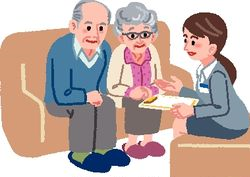
When taking care of an elderly person, it is important to know how to communicate with them properly. Here are some tips to help you communicate effectively.
Speak Slowly, Loudly, and Clearly ONLY If Needed
Many elderly people often have trouble hearing, but not all. First figure out if the senior you are caring for is hard of hearing. If so, make sure to speak loudly and clearly so that they can make out what you are saying. Do not speak too fast, and be prepared to repeat some things that you say. However, do not shout or talk to them in a condescending or patronizing way like you would speak to a child. Find out if English is their first language. A caretaker that speaks a senior native language might find communication easier.
Keep Things Simple
Explain new things in a simple manner. When talking with someone who is easily confused, stick to one topic at a time. Providing too much information to process at one time can cause confusion. If you aren’t sure if they understood, ask if they have any questions.
Speak Face to Face
It is a good idea to speak face to face while making eye contact. Body language and lip movements can help interpret what you are saying. Make sure to maintain eye contact when you speak and until you get an answer. I find this helpful when talking with my teenager as well : )
Listen
It is most important to listen to what they have to say. Make sure to be fully attentive, not just to what is being said but how it is expressed. Do they mean something else? Make sure your body language also shows that you are listening. Be patient; it might take them time to find the right words, or complete a story.
Be Respectful
Make sure to give them the respect that they deserve. Do not brush away their concerns or requests. Instead of ordering them to do something, ask them if they would like to do it and respect their wishes whenever possible. Pick your battles! Do not get into an argument over something that is not important. Treat your ward as you want to be treated.
Do you have any other communication suggestions?